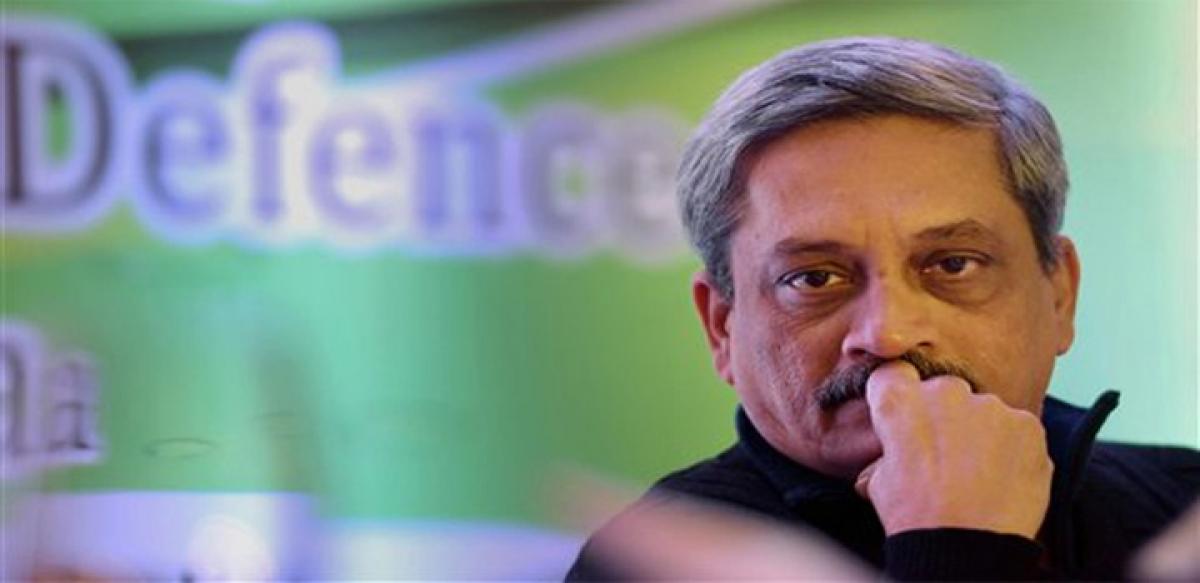Live
- Infant kidnapped from Niloufer Hospital rescued, cops arrest 3
- Sunny Leone reflects on challenges and preparations for ‘Shero’
- Hyderabad Saree Festival 2024 kicks off in a grand manner
- Speed up Veligonda project works, CPM urges govt
- 10 career opportunities with a public policy degree
- TG Medical Council cracks whip on fake doctors
- TTD takes up mammoth waste management exercise
- Celebrating the power of communication
- Standing at work can actually be detrimental to BP
- Adani US bribery case reaches SC
Just In

Defence Minister Manohar Parrikar’s announcement that India is willing to export missiles is a radical departure from its long-held defence policy. This change is expected to receive sharp international reaction. In fact, India’s Agni missile programme was subjected to international sanctions. India embarked upon Integrated Guided Missile Development Programme as part of its policy of Minimum Cr
Defence Minister Manohar Parrikar’s announcement that India is willing to export missiles is a radical departure from its long-held defence policy. This change is expected to receive sharp international reaction. In fact, India’s Agni missile programme was subjected to international sanctions. India embarked upon Integrated Guided Missile Development Programme as part of its policy of Minimum Credible Nuclear Deterrence. India always used this missile development programme as only a self-defence mechanism.
India has twice tested its nuclear strike capability. But it has imposed a self-restraint by adhering to the ‘Nuclear No First Use’ principle. However, the nuclear policy doctrine envisages minimum nuclear deterrence to thwart any possible misadventure against India. The acquisition of nuclear capable missiles that can carry nuclear war heads is thus a part of the nuclear deterrence doctrine.
Moving far away from this national consensus-driven policy, now the Defence Minister hints at missile exports, raising several concerns. The United States imposed sanctions on India and Russia when the two nations agreed to share Cryogenic technology used in our space programme. The sanctions were imposed under Missile Technology Control Regime (MTCR) to which India is not even a signatory. The international community may not take the policy change favourably. Perhaps, the government might be emboldened by the strategic shift in its foreign and defence policy toward the United States.
A surge in its defence exports was recorded in nine months to end-2015, with the net value touching almost $210 million (Rs 1,400 crore). The major destinations for defence exports from India include Afghanistan, Algeria, Belgium, Ecuador, Indonesia, Israel, Myanmar, Nepal, Oman, Romania, Russia, South Korea, Sudan, Vietnam and the UK.
Among the major items being exported are offshore patrol vessels, spares for radars, Cheetal helicopters, turbo chargers and batteries, electronic systems, light engineering mechanical parts and personal protective items, which comprise articles like helmets, bulletproof jackets and other types of clothing. Such defence exports bring India valuable foreign exchange without any implications for its foreign or defence policy.
But, the same is not true with export of missile technology. India already has the experience of facing sanctions on its Agni programme, too. The proliferation of missile technology is seriously viewed by world powers. Besides, it has implications for India’s national security, too. What is the guarantee that missiles exported by India do not ultimately land in the hands of nations or non-state actors hostile to India. India’s decision to export missiles has the potential to trigger dangerous missile race in the fragile South Asian region, having grave implications for our national security.
India has been fighting against proliferation of nuclear arms. It refused to sign discriminatory treaties on proliferation of nuclear and missile technologies. But, missile exports would raise questions on India’s principal position. Foreign and defence policies, especially nuclear and missile policies, cannot be the prerogative of any particular party or any government of the day. National consensus should drive any change in strategic policies.

© 2024 Hyderabad Media House Limited/The Hans India. All rights reserved. Powered by hocalwire.com







